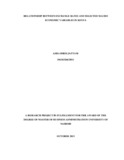| dc.description.abstract | Many developing economies have experienced challenges in handling the exchange rate equilibrium. This translates into a high degree of uncertainty for the two main monetary policy objectives that policymakers often seek to achieve: price stability and economic growth. Despite the importance of determinants of exchange rate policies in economic management, few government agencies have implemented the recommendations by scholars. Kenya, just like other developing countries has experienced a combination of exogenous shocks such as worsening terms of trade mainly on account of fluctuations in international commodity prices, oil price shocks and volatility in capital flows, which have created macroeconomic management policy challenges. The purpose of this study was to investigate the factors that determine exchange rates in Kenya and how those factors influence the exchange rates.This study adopted a quantitative research design. Secondary data involved the collection and analysis of published material and information from other sources such as the Central Bank of Kenya, Kenya National Bureau of Statistics, Ministry of The National Treasury and Ministry of Commerce and Tourism. Data was analyzed using SPSS and presented by use of figures and graphs. The study concludes that the exchange rate is high in Kenya and that it is on the increase. The study further concludes that exchange rates in Kenya are significantly affected by political factor, balance of payment, average annual interest rate and inflation rates. This study therefore recommends that policy makers should enact policies that improve the balance of payment so as to contribute towards gaining value of the Kenyan shilling against foreign currencies. The policy makers should come up with policies that will contribute to lowering the exchange rates in Kenya and contribution to reversing this trend. The study also recommends that policy makers should enact policies that will lower the inflation rates in Kenya. | en |

